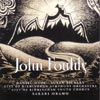Foulds Orchestral and Vocal Works
A fascinating portrait of a colourful, restless personality
View record and artist detailsRecord and Artist Details
Composer or Director: John Foulds
Genre:
Orchestral
Label: Warner Classics
Magazine Review Date: 13/2004
Media Format: CD or Download
Media Runtime: 78
Mastering:
Stereo
DDD
Catalogue Number: 2564 61525-2

Tracks:
| Composition | Artist Credit |
|---|---|
| Lyra Celtica |
John Foulds, Composer
City of Birmingham Symphony Orchestra John Foulds, Composer Sakari Oramo, Conductor Susan Bickley, Mezzo soprano |
| Apotheosis |
John Foulds, Composer
City of Birmingham Symphony Orchestra Daniel Hope, Violin John Foulds, Composer Sakari Oramo, Conductor |
| Mirage |
John Foulds, Composer
City of Birmingham Symphony Orchestra John Foulds, Composer Sakari Oramo, Conductor |
| (3) Mantras, Movement: Mantra of activity |
John Foulds, Composer
City of Birmingham Symphony Orchestra John Foulds, Composer Sakari Oramo, Conductor |
| (3) Mantras, Movement: Mantra of bliss |
John Foulds, Composer
City of Birmingham Symphony Orchestra City of Birmingham Symphony Youth Chorus John Foulds, Composer Sakari Oramo, Conductor |
| (3) Mantras, Movement: Mantra of will |
John Foulds, Composer
City of Birmingham Symphony Orchestra John Foulds, Composer Sakari Oramo, Conductor |
Author: Andrew Achenbach
Sakari Oramo has been programming plenty of 20th-century British music during his Birmingham tenure, a policy which now bears spectacular fruit with this generous and enterprising disc devoted to Manchester-born John Foulds (1880-1939). A self-taught figure, Foulds won some measure of fame in his lifetime with his light music and World Requiem (1919-21); later in his career, he developed an interest in theosophy and all things Eastern, and had spells in Paris and India (where he died of cholera).
The extraordinary Three Mantras (1919-30) originally served as the preludes to the three acts of Foulds’s abandoned Sanskrit opera, Avatara. In the opening ‘Mantra of Activity’ Oramo daringly sets an even more propulsive tempo than does Barry Wordsworth on his pioneering Lyrita recording, yet with no loss of composure. A wordless female chorus intensifes the atmosphere of mystic awe that permeates the succeeding ‘Mantra of Bliss’. The concluding ‘Mantra of Will’ strictly employs the seven-note modal scale of a South Indian raga. A daring, extended pause ushers in a flamboyantly savage pay-off (here rather more transparent and tidier in execution than under Wordsworth).
Next comes Lyra Celtica, a concerto for wordless voice and orchestra written between 1917 and the mid-1920s for his wife, the soprano Maud McCarthy. In the event Foulds completed only two of the three movements (the finale remains a 150-bar fragment). It’s an alluring discovery, which deploys both microtones and quarter-tones (a Foulds trademark). Mezzo Susan Bickley rises valiantly to the challenge.
By comparison, Apotheosis (1909) and Mirage (1910) strike a rather more conventional note, though Daniel Hope’s contribution in the former locates the lyrical beauty in this heartfelt elegy in memory of Joachim. Richard Strauss looms large in Mirage an opulent 23-minute tone-poem with much arresting incident, which Oramo and the CBSO do proud.
The sound is hugely vivid and Calum MacDonald’s annotation a model of its kind. Don’t miss this gem of a release.
The extraordinary Three Mantras (1919-30) originally served as the preludes to the three acts of Foulds’s abandoned Sanskrit opera, Avatara. In the opening ‘Mantra of Activity’ Oramo daringly sets an even more propulsive tempo than does Barry Wordsworth on his pioneering Lyrita recording, yet with no loss of composure. A wordless female chorus intensifes the atmosphere of mystic awe that permeates the succeeding ‘Mantra of Bliss’. The concluding ‘Mantra of Will’ strictly employs the seven-note modal scale of a South Indian raga. A daring, extended pause ushers in a flamboyantly savage pay-off (here rather more transparent and tidier in execution than under Wordsworth).
Next comes Lyra Celtica, a concerto for wordless voice and orchestra written between 1917 and the mid-1920s for his wife, the soprano Maud McCarthy. In the event Foulds completed only two of the three movements (the finale remains a 150-bar fragment). It’s an alluring discovery, which deploys both microtones and quarter-tones (a Foulds trademark). Mezzo Susan Bickley rises valiantly to the challenge.
By comparison, Apotheosis (1909) and Mirage (1910) strike a rather more conventional note, though Daniel Hope’s contribution in the former locates the lyrical beauty in this heartfelt elegy in memory of Joachim. Richard Strauss looms large in Mirage an opulent 23-minute tone-poem with much arresting incident, which Oramo and the CBSO do proud.
The sound is hugely vivid and Calum MacDonald’s annotation a model of its kind. Don’t miss this gem of a release.
Discover the world's largest classical music catalogue with Presto Music.

Gramophone Digital Club
- Digital Edition
- Digital Archive
- Reviews Database
- Full website access
From £8.75 / month
Subscribe
Gramophone Full Club
- Print Edition
- Digital Edition
- Digital Archive
- Reviews Database
- Full website access
From £11.00 / month
Subscribe
If you are a library, university or other organisation that would be interested in an institutional subscription to Gramophone please click here for further information.




